最新人教版英语八年级上册第五单元知识点归纳
人教版八年级上册英语Unit5单元知识点总结

人教版八年级上册英语Unit 5单元知识点总结Unit 5 Do you want to watch a game show?知识点1、think of = think about 认为例:What do you think of (=how do you like )this movie? 你认为这个电影怎么样What does your father think of his boss? How about doing…? 做……怎么样?2、mind n 头脑、想法 change one’s mind改变主意 make up one’s mind 下决心v介意;在乎;反对I don’t mind them.我不介意他们表示请求或征求意见Would you mind doing …?例:Would you mind opening the door?Do you mind …?Do you mind my dog?3、stand 顺利接受;忍受(多用于否定句、疑问句)例:I can’t stand it! 我不能忍受它/ 我受不了它!4、too 与either的区别too 也肯定意义与肯定的表达方法连用either 也不否定意义与否定的表达方法连用例:--My brother likes to play soccer.--I do, too.--My brother doesn’t like to play soccer. ?--I don’t, either.5、a thirteen-year-old boy 一个十三岁的男孩此结构中,year用单数形式,且用连字符类似的结构还有: five-month-old baby 五个月大的婴儿试比较:He is thirteen years old.He is a thirteen-year-old student.6、hair clip发卡hair band 发带hair cut发型,发式;理发(名词)hair dresser理发师 7、happensth happen +时间/地点某时某地发生了什么sth happen to sb 某人出了某事(不好的事情)sb happen to do sth 某人碰巧做某事It happened that 碰巧发生某事8、be famous/well-known for 因什么而出名be famous/well-known as 作为什么而出名as famous as 与……一样有名9、dress up 盛装打扮dress sb up/dress uo sb 盛装打扮某人dress sb /oneself 给某人穿衣服get dressed 穿衣服put on 穿衣服(强调动作)wear穿衣服(强调状态)10.the other, the others, other, others, another。
Unit5单元知识点归纳总结人教版八年级英语上册

Unit 5 知识归纳重点短语soap opera 肥皂剧talent show 才艺秀talk show 脱口秀game show 竞赛节目sports show 体育节目action movie 动作影片scary movie 恐怖电影cartoon with sound and music 带有配音和音乐的卡通片learn ... from ... 从……学习……have a discussion about ... 就……进行讨论dress up 装扮;乔装打扮e out 出版,发行in the 1930s (/in the 1930’s) 在20世纪30年代one of the main reasons 主要原因之一face any danger 面对任何危险be(get) ready to do sth. 准备好(做某事);愿意(做某事)be(get) ready for sth. 为某事做好准备hope to do sth. 希望做某事expect to do sth. 期望做某事expect sb. to do sth. 期望某人做某事take sb.’s place= take the place of sb. 代替;替换fight in the army 从军打仗play sb.’s role 扮演某人的角色mind doing sth. 介意做某事can’t stand doing sth. 不能忍受做某事plan to do sth. = make a plan to do sth. 计划做某事动词不定式一.形式动词不定式:非谓语动词;动词原形前+to(动词不定式符号)形式:to do (否定形式:not to do)二.语法作用(1)动词不定式(短语)作主语:It is good for us to run in the morning.It is very hard to be a magician.It is healthy to get up early and go to bed early.It is our dream to build a bridge.It takes me five hours to get here from my home.(2)动词不定式(短语)作宾语:She expects to learn a lot form the news.Mike hopes to be a TV reporter one day.I don’t want to watch a scary movie tonight.I plan to join the army when I am 18.(3)动词不定式(短语)作宾补:V +sb.+(not) to doI want you to finish the work in three days.My mom expects me to go to school by myself.(4)动词不定式(短语)作表语:My dream is to be a teacher.My plan is to leave next week.(5)动词不定式(短语)作定语:They give people a way to make their dream e true. Greenwood is the best place to go to on weekends.(6)动词不定式(短语)作状语:目的状语Almost everyone goes there to see the street performers. We study hard to get good grades.。
人教版八年级上英语第五单元重点知识点整理
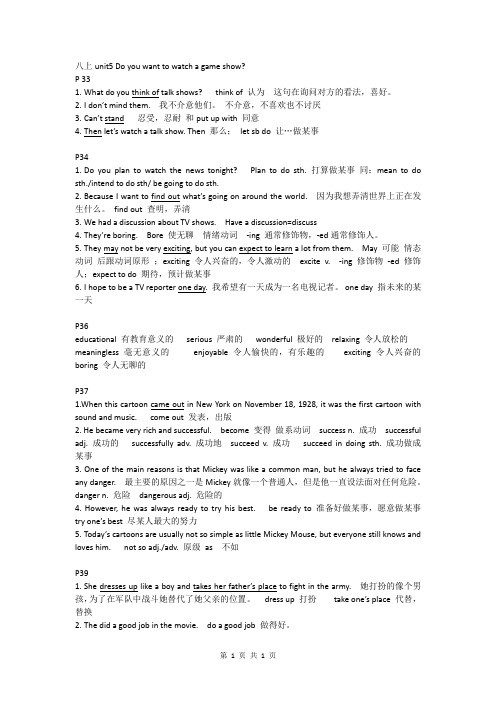
八上unit5 Do you want to watch a game show?P 331.What do you think of talk shows? think of 认为这句在询问对方的看法,喜好。
2.I don’t mind them. 我不介意他们。
不介意,不喜欢也不讨厌3.Can’t stand 忍受,忍耐和put up with 同意4.Then let’s watch a talk show. Then 那么;let sb do 让…做某事P341.Do you plan to watch the news tonight? Plan to do sth. 打算做某事同:mean to do sth./intend to do sth/ be going to do sth.2.Because I want to find out what’s going on around the world. 因为我想弄清世界上正在发生什么。
find out 查明,弄清3.We had a discussion about TV shows. Have a discussion=discuss4.They’re boring. Bore 使无聊情绪动词-ing 通常修饰物,-ed通常修饰人。
5.They may not be very exciting, but you can expect to learn a lot from them. May 可能情态动词后跟动词原形;exciting 令人兴奋的,令人激动的excite v. -ing 修饰物-ed 修饰人;expect to do 期待,预计做某事6.I hope to be a TV reporter one day. 我希望有一天成为一名电视记者。
one day 指未来的某一天P36educational 有教育意义的serious 严肃的wonderful 极好的relaxing 令人放松的meaningless 毫无意义的enjoyable 令人愉快的,有乐趣的exciting 令人兴奋的boring 令人无聊的P371.When this cartoon came out in New York on November 18, 1928, it was the first cartoon with sound and music. come out 发表,出版2. He became very rich and successful. become 变得做系动词success n. 成功successful adj. 成功的successfully adv. 成功地succeed v. 成功succeed in doing sth. 成功做成某事3. One of the main reasons is that Mickey was like a common man, but he always tried to face any danger. 最主要的原因之一是Mickey就像一个普通人,但是他一直设法面对任何危险。
人教版八年级上册英语 知识点语法归纳总结 Unit 5

Unit 5 Do you want to watch a game show?1.短语归纳2.典句必背3.用法集萃(1)What do you want to watch? 你想看什么?❖辨析: look,see,watch与notice(2)I don’t mind them. 我不介意它们。
❖mind用作动词时,意思是“介意”,常用于否定句、疑问句中,其后通常跟名词、动名词、代词或从句。
例:I don’t mind the noise during the day. 我并不介意白天的噪声(名词)Would you mind waiting outside for a moment? 您介意在外面等一会儿吗?(动名词)Do you mind if I ask you one more question? 您介意我再问您一个问题吗?(从句)(3)Do you plan to watch the news tonight? 今晚你打算看新闻吗?❖plan作动词时,意为“计划,打算”,其现在分词形式为planning,过去式为planned。
plan 常见的用法有:(4)Because I hope to find out what’s going on around the world.因为我希望弄清楚世界各地正在发生的事❖hope的用法❖辨析:expect, hope, wish与look forward to(5)Oh, I can’t stand them. 哦,我受不了它们。
❖ stand 在这里是一个及物动词,意思是“忍受,容忍”。
后面接名词、代词或动名词作宾语。
stand 的常见用法如下:(6) ..but you can expect to learn a lot from them. 但是你可以期望从它们中学到很多东西 ❖ expect 意为“期待,期望”,其具体用法如下:(7) But one very famous symbol in American culture is a cartoon.但是在美国文化中一个非常有名的代表就是卡通片。
Unit5笔记人教版英语八年级上册
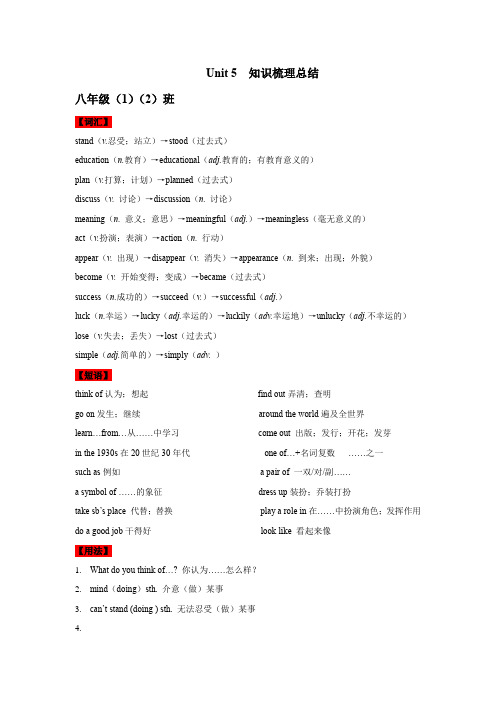
Unit 5 知识梳理总结八年级(1)(2)班【词汇】stand(v.忍受;站立)→stood(过去式)education(n.教育)→educational(adj.教育的;有教育意义的)plan(v.打算;计划)→planned(过去式)discuss(v. 讨论)→discussion(n. 讨论)meaning(n.意义;意思)→meaningful(adj.)→meaningless(毫无意义的)act(v.扮演;表演)→action(n. 行动)appear(v.出现)→disappear(v.消失)→appearance(n. 到来;出现;外貌)become(v.开始变得;变成)→became(过去式)success(n.成功的)→succeed(v.)→successful(adj.)luck(n.幸运)→lucky(adj.幸运的)→luckily(adv.幸运地)→unlucky(adj.不幸运的)lose(v.失去;丢失)→lost(过去式)simple(adj.简单的)→simply(adv.)【短语】think of认为;想起find out弄清;查明go on发生;继续around the world遍及全世界learn…from…从……中学习come out 出版;发行;开花;发芽in the 1930s在20世纪30年代one of…+名词复数……之一such as例如 a pair of 一双/对/副……a symbol of ……的象征dress up装扮;乔装打扮take sb’s place 代替;替换play a role in在……中扮演角色;发挥作用do a good job干得好look like 看起来像【用法】1.What do you think of…? 你认为……怎么样?2.mind(doing)sth. 介意(做)某事3.can’t stand (doing ) sth. 无法忍受(做)某事4.5.expect to do sth.期待做某事expect sb. to do. sth. 期待某人做某事6.try one’s best尽某人最大的努力7.be ready to do sth. 准备好做某事;愿意做某事8.see sb. do 看到某人做某事see sb. doing 看到某人正在做某事9.as+ adj/adv. + as 和……一样…not as/so as adj/adv. + as 不像……那样【Language points】1.show ①【可数名词】(电视或广播的)节目talk show 访谈节目②【名词】表演;展览on show 在展出;在展览中2.I don’t mind them. 我不介意它们。
人教版英语八年级上册第五单元知识点归纳
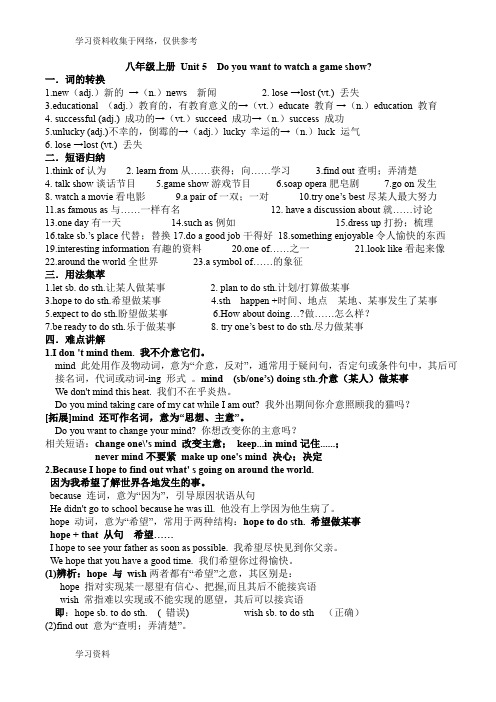
八年级上册Unit 5 Do you want to watch a game show?一.词的转换1.new(adj.)新的→(n.)news 新闻2. lose →lost (vt.) 丢失cational (adj.)教育的,有教育意义的→(vt.)educate 教育→(n.)education 教育4. successful (adj.) 成功的→(vt.)succeed 成功→(n.)success 成功5.unlucky (adj.)不幸的,倒霉的→(adj.)lucky 幸运的→(n.)luck 运气6. lose →lost (vt.) 丢失二.短语归纳1.think of认为2. learn from从……获得;向……学习3.find out查明;弄清楚4. talk show谈话节目5.game show游戏节目6.soap opera肥皂剧7.go on发生8. watch a movie看电影9.a pair of一双;一对10.try one’s best尽某人最大努力11.as famous as与……一样有名12. have a discussion about就……讨论13.one day有一天14.such as例如15.dress up打扮;梳理16.take sb.’s place代替;替换17.do a good job干得好18.something enjoyable令人愉快的东西19.interesting information有趣的资料20.one of……之一21.look like看起来像22.around the world全世界23.a symbol of……的象征三.用法集萃1.let sb. do sth.让某人做某事2. plan to do sth.计划/打算做某事3.hope to do sth.希望做某事4.sth happen +时间、地点某地、某事发生了某事5.expect to do sth.盼望做某事6.How about doing…?做……怎么样?7.be ready to do sth.乐于做某事8. try one’s best to do sth.尽力做某事四.难点讲解1.I don 't mind them. 我不介意它们。
人教版八年级上册英语第五单元Unit5《重要知识点》汇总总结

人教版八年级上册英语第五单元Unit5《重要知识点》汇总总结UNIT 5 Do you want to watch a game show?Section A(1a-3c)重点短语1. talk show访谈节目2. soap opera 肥皂剧3. find out查明;弄清4. around the world全世界5. learn from 向……学习;从……中学习6. expect to do sth. 期望做某事7. watch a sports show 观看体育节目8. have a discussion about… 就……进行讨论9. game show 竞赛节目重点句型1. What do you think of talk shows?你认为访谈节目怎么样?2. I don't mind them. 我不介意它们。
3. I can't stand them. 我不能忍受它们。
4. What do you plan to watch tonight? 你计划今晚看什么?5. Because I hope to find out what's going on around the world.因为我希望弄清世界上正在发生什么。
Section B(1a-Self Check)重点短语1. action movie动作影片2. be ready to准备好/愿意(做某事)3. dress up装扮;乔装打扮4. take sb's place代替;替换5. do a good job干得好6. scary movie 恐怖影片7. come out 出版;发行8. try one's best 尽某人最大的努力9. a pair of一双;一对10. a symbol of……的象征重点句型1. In the 1930s, he made 87 cartoons with Mickey. 在20 世纪30 年代,他制作了87 部带有米老鼠的卡通片。
人教版八年级上册英语 Unit 5单元知识点总结
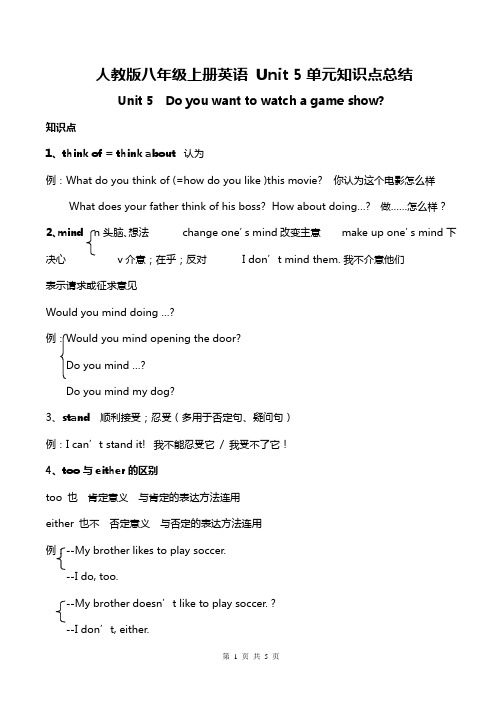
人教版八年级上册英语Unit 5单元知识点总结Unit 5 Do you want to watch a game show?知识点1、think of = think about 认为例:What do you think of (=how do you like )this movie? 你认为这个电影怎么样What does your father think of his boss? How about doing…? 做……怎么样?2、mind n 头脑、想法 change one’s mind改变主意 make up one’s mind 下决心v介意;在乎;反对I don’t mind them.我不介意他们表示请求或征求意见Would you mind doing …?例:Would you mind opening the door?Do you mind …?Do you mind my dog?3、stand 顺利接受;忍受(多用于否定句、疑问句)例:I can’t stand it! 我不能忍受它/ 我受不了它!4、too 与either的区别too 也肯定意义与肯定的表达方法连用either 也不否定意义与否定的表达方法连用例:--My brother likes to play soccer.--I do, too.--My brother doesn’t like to play soccer. ?--I don’t, either.5、a thirteen-year-old boy 一个十三岁的男孩此结构中,year用单数形式,且用连字符类似的结构还有: five-month-old baby 五个月大的婴儿试比较:He is thirteen years old.He is a thirteen-year-old student.6、hair clip发卡hair band 发带hair cut发型,发式;理发(名词)hair dresser理发师 7、happensth happen +时间/地点某时某地发生了什么sth happen to sb 某人出了某事(不好的事情)sb happen to do sth 某人碰巧做某事It happened that 碰巧发生某事8、be famous/well-known for 因什么而出名be famous/well-known as 作为什么而出名as famous as 与……一样有名9、dress up 盛装打扮dress sb up/dress uo sb 盛装打扮某人dress sb /oneself 给某人穿衣服get dressed 穿衣服put on 穿衣服(强调动作)wear穿衣服(强调状态)10.the other, the others, other, others, another。
最全面人教版八年级上册英语第五单元知识点归纳总结

Unit 5 Do you want to watch a game show?一、词汇与短语● 重点单词A部分1.sitcom n. 情景喜剧2.news n. 新闻节目;新闻3.mind v.介意;对(某事)烦恼4.stand v. 忍受;站立cational adj.教育的;有教育意义的6.plan v. & n. 几打算;计划7.hope v. & n. 希望8.discussion n. 讨论;商量9.happen v. 发生;出现10.expect v. 预料;期待11.joke n. 笑话;玩笑edy n. 喜剧;喜剧片B部分1.meaningless adj.毫无意义的;意思不明确的2.action n. 行动3.cartoon n. 动画片;卡通片4.culture n. 文化;文明5.famous adj. 著名的;出名的6.appear v. 出现7.become v. 开始变得;变成8.rich adj. 富有的9.successful adj. 获得成功的;有成就的10.might modal v. 可能;可以11.main adj. 主要的;最重要的12.reason n. 原因;理由mon adj. 普通的;常见的14.film n. 电影15.unlucky adj. 不幸的;不吉利的16.lose v. 失去;丢失17.ready adj. 愿意的;准备好的18.character n. 人物;角色19.simple adj. 简单的;易做的20.army n. 陆军;陆军部队● 重点短语A部分1.talk show 谈话类节目2.game show 游戏类节目3.soap opera 肥皂剧4.sports show 运动类节目5.think of 想起;认为6.plan to do sth. 计划做某事7.hope to do sth. 希望做某事8.my favorite TV shows 我最喜欢的电视节目9.go on 发生10.have a discussion about 就…进行讨论11.expect to do sth. 期望做某事12.learn from 向…学习B部分1.action movie 动作影片2.over 80 years ago 八十多年前e out 出版;发行4.in the 1930s 在20世纪30年代5.try one's best 尽某人最大努力6.one of the main reasons 主要原因之一7.dress up 装扮;乔装打扮8.be ready to 准备好(做某事);愿意(做某事)9.do a good job 干得好10.take sb.'s place代替某人;替换某人● 重点句子A部分1.--What do you think of talk shows? “你认为访谈类节目怎么样?”--I don't mind them. /I can't stand them. /I love watching them.“我不介意它们。
(完整版)人教版八年级英语上第五单元知识点总结
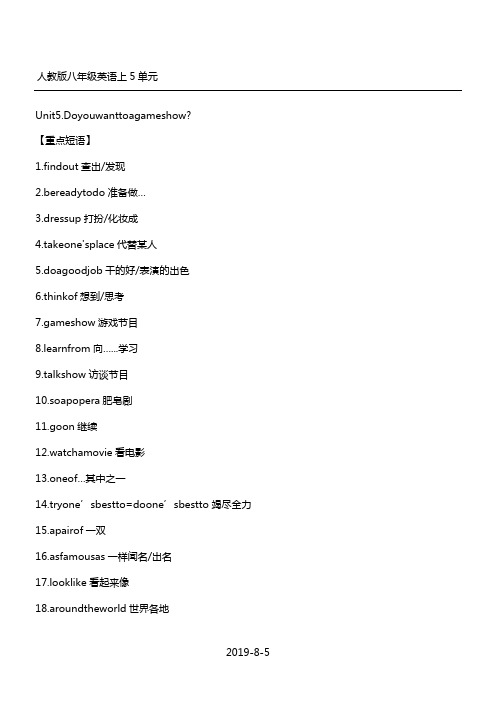
人教版八年级英语上5单元Unit5.Doyouwanttoagameshow?【重点短语】1.findout查出/发现2.bereadytodo准备做…6.thinkof11.goon15.apairof一双16.asfamousas一样闻名/出名17.looklike看起来像18.aroundtheworld世界各地19.haveadiscussionabout讨论…...20.oneday有一天/某一天21.suchas例如22.asymbolof一个象征/标志23.somethingenjoyable快乐的事情24.interestinginformation有趣的信息odWalkofFame.1978年11月18日,Mickey成为在好莱坞星光大道上拥有一颗星星的第一个卡通形象。
7.Today’scartoonsareusuallynotsosimpleaslittleMickeyMouse,buteveryonestillknowsandloveshim.今天的卡通通常都不如MickeyMouse那样简单,但是人人都知道他,热爱他。
8.WhohasapairofearsmorefamousthanMickey’s?谁有一双比Mickey的耳朵更闻名于世的呢?9.Ithinkthosemoviesaresomeaningless.我认为那些电影如此地毫无意义。
10.I’dliketofindoutwhatdifferentpeoplethinkofasubject.sitcom['sɪnews[njuːsoap[səʊplan[plæn]n.计划;方法v.打算;计划hope[həʊp].希望;期望;盼望n.希望discussion[dɪ'skʌʃn]n.讨论;谈论stand[stænd]v.站立;忍受happen['hæpən]vi.发生;碰巧;出现;偶遇may[meɪ]aux.可以,能够;可能,也许expect[ɪk'spekt]v.预期;期待;盼望joke[dʒəʊk]n.笑话;玩笑v.说笑话;开玩笑comedy['kɒmədi]n.喜剧;滑稽;幽默事件findout查明;弄清appear[ərich[rɪtʃmight[mamain[meɪreason['rifilm[fɪlm]n.电影unlucky[ʌn'lʌki]adj.倒霉的;不幸的;不吉利的lose[luːz]vt.丢失;失败vi.失败ready['redi]adj.准备好的;乐意的character['kærəktə(r)]n.个性;品质;人物;simple['sɪmpl]adj.简单的;朴素的;单纯的;笨的army['ɑːmi]n.军队;陆军;一大批actionmovie动作片bereadyto愿意迅速做某事dressup装扮;乔装打扮。
人教版八年级上册英语unit 5 知识点梳理

人教版英语八上Unit 5 知识点一.短语归纳1. think of 认为2. learn...from... 向......学习3. the answers to the questions 问题的答案4. find out 查明;弄清5. go on 发生6. around the world 世界各地7. have a discussion about 就......进行讨论8. come out 出版,发行9. in the 1930s 在20世纪30年代10. one of ......之一11. try one’s best 尽某人最大的努力12. a symbol of... ......的象征13. Chinese culture 中国文化14. dress up 装扮;乔装打扮15. take one’s place 代替;替换16. do a good job 做得好17. something enjoyable 令人愉快的东西二.知识点梳理1. What do you think of talk shows? 你觉得访谈节目怎么样?show在此处用作可数名词,意为“(电视或广播)节目”。
Do you want to watch a game show? 你想看游戏节目吗?【拓展】①show用作名词,还可以表示“表演;展览”。
There is a painting show tonight. 今晚有画展。
②show作及物动词,意为“给......看;展示”。
show sb. sth. = show sth. to sb. 给某人看某物Can you show me your ruler? = Can you show your ruler to me? 你能给我看看你的尺子吗?2.I don’t mind them. 我不介意它们。
mind在此处作及物动词,意为“介意”,后面可以接名词、代词或动词-ing形式。
八年级上册英语人教版unit5知识点

八年级上册英语人教版unit5知识点本文旨在对八年级上册英语人教版Unit5的知识点进行总结和梳理,帮助同学们更好地学习和掌握相关知识。
1. 现在完成时现在完成时是指过去发生的动作或状态对现在造成影响。
现在完成时的构成是“have/has + 过去分词”。
例如:- I have finished my homework.(我已经完成了我的作业。
)- He has lived in Beijing for three years.(他已经在北京住了三年了。
)2. 现在完成时与过去时的区别现在完成时和过去时的区别在于时间表达上。
现在完成时强调目前的状态,而过去时强调发生在过去的动作。
例如:- I have been to the cinema.(现在完成时,强调现在的状态。
)- I went to the cinema yesterday.(过去时,强调发生在过去的动作。
)3. 以“ever”和“never”为标志的疑问句以“ever”和“never”为标志的疑问句通常用于询问某一行为或经历是否曾经发生过。
例如:- Have you ever been to Hong Kong?(你曾经去过香港吗?)- Have you never been to New York?(你从来没有去过纽约吗?)4. 介词“since”和“for”的用法介词“since”和“for”通常用于表示时间的长短。
其中,“since”表示从某个时间点开始到现在的时间长度,“for”则表示一段时间长度。
例如:- I have been learning English since 2010.(我从2010年开始学习英语。
)- I have been learning English for 10 years.(我已经学习英语10年了。
)5. 特殊的动词和介词搭配一些动词和介词的搭配是特殊的,需要特别注意。
例如:- listen to:听- look at:看- get up:起床- come back:回来以上就是八年级上册英语人教版Unit5的知识点总结和梳理。
八年级上册英语人教版第五单元笔记
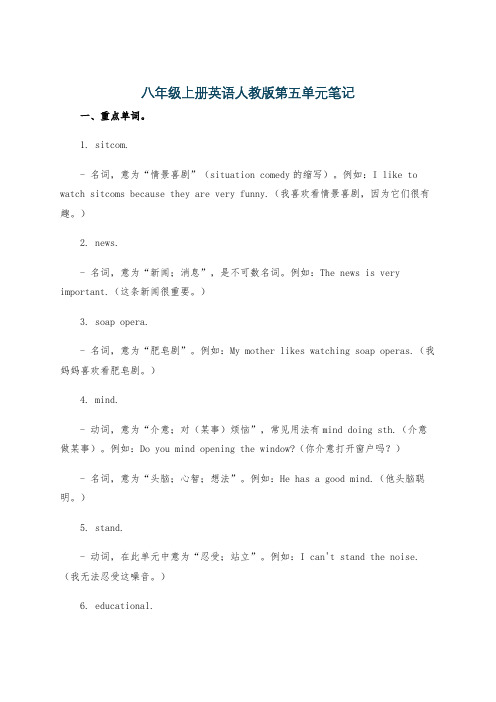
八年级上册英语人教版第五单元笔记一、重点单词。
1. sitcom.- 名词,意为“情景喜剧”(situation comedy的缩写)。
例如:I like to watch sitcoms because they are very funny.(我喜欢看情景喜剧,因为它们很有趣。
)2. news.- 名词,意为“新闻;消息”,是不可数名词。
例如:The news is very important.(这条新闻很重要。
)3. soap opera.- 名词,意为“肥皂剧”。
例如:My mother likes watching soap operas.(我妈妈喜欢看肥皂剧。
)4. mind.- 动词,意为“介意;对(某事)烦恼”,常见用法有mind doing sth.(介意做某事)。
例如:Do you mind opening the window?(你介意打开窗户吗?)- 名词,意为“头脑;心智;想法”。
例如:He has a good mind.(他头脑聪明。
)5. stand.- 动词,在此单元中意为“忍受;站立”。
例如:I can't stand the noise.(我无法忍受这噪音。
)6. educational.- 形容词,意为“教育的;有教育意义的”。
例如:This program is very educational.(这个节目很有教育意义。
)7. plan.- 名词,意为“计划;打算”。
例如:What's your plan for this weekend?(你这个周末的计划是什么?)- 动词,意为“计划;打算”,常见用法为plan to do sth.(计划做某事)。
例如:I plan to go to the park tomorrow.(我计划明天去公园。
)8. hope.- 动词,意为“希望”,常见用法为hope to do sth.(希望做某事)或hope + (that)从句。
最全面人教版八年级上册英语第五单元知识点归纳总结
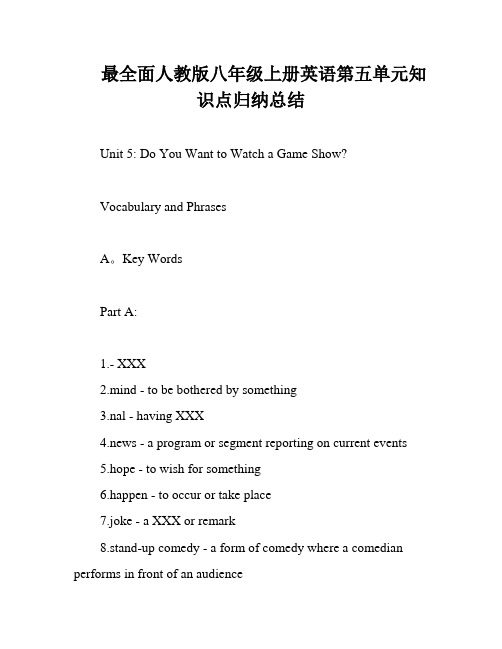
最全面人教版八年级上册英语第五单元知识点归纳总结Unit 5: Do You Want to Watch a Game Show?Vocabulary and PhrasesA。
Key WordsPart A:1.- XXX2.mind - to be bothered by something3.nal - having XXX4.news - a program or segment reporting on current events5.hope - to wish for something6.happen - to occur or take place7.joke - a XXX or remark8.stand-up comedy - a form of comedy where a comedian performs in front of an audience9.cartoon - an animated film or TV show10.famous - well-known or XXX11.e - to start to be or come to be12.successful - XXX13.main - most XXX significantmon - XXX15.unlucky - having bad XXX16.ready - XXX do something17.simple - easy to do or understand18.culture - the customs。
beliefs。
and practices of a particular group or society19.appear - to come into sight or e visible20.rich - having a lot of money or nsPart B:1.meaningless - having no XXX significance2.n - something done or XXX3.n - the act of XXX4.stand - to XXX or endure something5.plan - to intend or decide to do somethingedy - a XXX7.e popular - XXX-XXX8.dress up - to wear special XXX9.do a good job - to perform well or successfullyB。
人教版八年级上册英语第五单元重点知识总结

Unit 5 1.Words News mind stand educa onal plan hope discussion happen expect joke sitcom soap opera comedy ac on movie cartoon meaningless famous rich successful culture appear become might main reason common film unlucky lose ready simple army 重点讲解:重点讲解:1)Mind n. 理智,精神;意见;智力;记忆力理智,精神;意见;智力;记忆力Eg:I'm trying to clear my mind of all this. 我正试图把这一切都从我脑子里清理出去。
There was no doubt in his mind that the man was serious. 毫不怀疑在他的脑海里这个人是认真的。
You have a good mind. 你很有才智。
你很有才智。
The key to his success is his logical mind. 他成功的关键在于他的逻辑思维。
他成功的关键在于他的逻辑思维。
vt. 介意;专心于;照料介意;专心于;照料vi. 介意;注意介意;注意Eg:I don't mind changing my metable for yours. 我并不介意改变我的时间表来配合你的。
<拓>短语短语in mind 记住,考虑到,想到;在心里;头脑中;时刻记住记住,考虑到,想到;在心里;头脑中;时刻记住in my mind 在我脑海中;在我的心中;在我精神世界里state of mind 心理状态,思想状态;心境心理状态,思想状态;心境would you mind 你介意…吗keep in mind 记住记住2)Stand vi. 站立;位于;停滞vt. 使站立;忍受;抵抗忍受使站立;忍受;抵抗 n.忍受Eg:It eats in her to stand idly by. 站在一旁无所事事,这使她很不好受。
人教版英语 八上Unit5 知识点归纳+练习
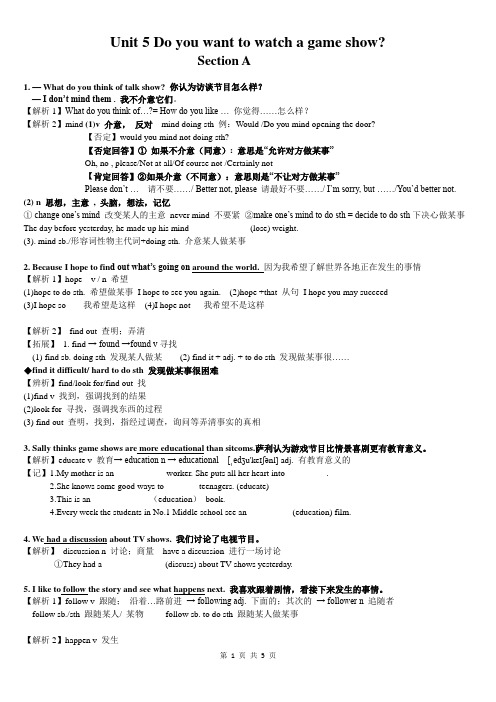
Unit 5 Do you want to watch a game show?Section A1. — What do you think of talk show? 你认为访谈节目怎么样?—I don’t mind them . 我不介意它们。
【解析1】What do you think of…?= How do you like …你觉得……怎么样?【解析2】mind (1)v 介意,反对mind doing sth 例:Would /Do you mind opening the door?【否定】would you mind not doing sth?【否定回答】①如果不介意(同意): 意思是“允许对方做某事”Oh, no , please/Not at all/Of course not /Certainly not【肯定回答】②如果介意(不同意):意思则是“不让对方做某事”Please don’t … 请不要……/ Better not, please 请最好不要……/I’m sorry, but ……/You’d better not.(2) n 思想,主意, 头脑,想法,记忆① change one’s mind 改变某人的主意never mind 不要紧②make one’s mind to do sth = decide to do sth下决心做某事The day before yesterday, he made up his mind _____________ (lose) weight.(3). mind sb./形容词性物主代词+doing sth. 介意某人做某事2. Because I hope to fin d out what’s going on around the world. 因为我希望了解世界各地正在发生的事情【解析1】hope v / n 希望(1)hope to do sth. 希望做某事I hope to see you again. (2)hope +that 从句I hope you may succeed(3)I hope so 我希望是这样(4)I hope not 我希望不是这样【解析2】find out 查明;弄清【拓展】 1. find → found →found v寻找(1) find sb. doing sth 发现某人做某(2) find it + adj. + to do sth 发现做某事很……◆find it difficult/ hard to do sth 发现做某事很困难【辨析】find/look for/find out 找(1)find v 找到,强调找到的结果(2)look for 寻找,强调找东西的过程(3) find out 查明,找到,指经过调查,询问等弄清事实的真相3. Sally thinks game shows are more educational than sitcoms.萨利认为游戏节目比情景喜剧更有教育意义。
- 1、下载文档前请自行甄别文档内容的完整性,平台不提供额外的编辑、内容补充、找答案等附加服务。
- 2、"仅部分预览"的文档,不可在线预览部分如存在完整性等问题,可反馈申请退款(可完整预览的文档不适用该条件!)。
- 3、如文档侵犯您的权益,请联系客服反馈,我们会尽快为您处理(人工客服工作时间:9:00-18:30)。
八年级上册Unit 5 Do you want to watch a game show?一.词的转换1.new(adj.)新的→(n.)news 新闻2. lose →lost (vt.) 丢失cational (adj.)教育的,有教育意义的→(vt.)educate 教育→(n.)education 教育4. successful (adj.) 成功的→(vt.)succeed 成功→(n.)success 成功5.unlucky (adj.)不幸的,倒霉的→(adj.)lucky 幸运的→(n.)luck 运气6. lose →lost (vt.) 丢失二.短语归纳1.think of认为2. learn from从……获得;向……学习3.find out查明;弄清楚4. talk show谈话节目5.game show游戏节目6.soap opera肥皂剧7.go on发生8. watch a movie看电影9.a pair of一双;一对10.try one’s best尽某人最大努力11.as famous as与……一样有名12. have a discussion about就……讨论13.one day有一天14.such as例如15.dress up打扮;梳理16.take sb.’s place代替;替换17.do a good job干得好18.something enjoyable令人愉快的东西19.interesting information有趣的资料20.one of……之一21.look like看起来像22.around the world全世界23.a symbol of……的象征三.用法集萃1.let sb. do sth.让某人做某事2. plan to do sth.计划/打算做某事3.hope to do sth.希望做某事4.sth happen +时间、地点某地、某事发生了某事5.expect to do sth.盼望做某事6.How about doing…?做……怎么样?7.be ready to do sth.乐于做某事8. try one’s best to do sth.尽力做某事四.难点讲解1.I don 't mind them. 我不介意它们。
mind 此处用作及物动词,意为“介意,反对”,通常用于疑问句,否定句或条件句中,其后可接名词,代词或动词-ing 形式。
mind (sb/one’s) doing sth.介意(某人)做某事We don't mind this heat. 我们不在乎炎热。
Do you mind taking care of my cat while I am out? 我外出期间你介意照顾我的猫吗?[拓展]mind 还可作名词,意为“思想、主意”。
Do you want to change your mind? 你想改变你的主意吗?相关短语:change one\'s mind 改变主意;keep...in mind记住......;never mind不要紧make up one's mind 决心;决定2.Because I hope to find out what' s going on around the world.因为我希望了解世界各地发生的事。
because 连词,意为“因为”,引导原因状语从句He didn't go to school because he was ill. 他没有上学因为他生病了。
hope 动词,意为“希望”,常用于两种结构:hope to do sth. 希望做某事hope + that 从句希望……I hope to see your father as soon as possible. 我希望尽快见到你父亲。
We hope that you have a good time. 我们希望你过得愉快。
(1)辨析:hope 与wish两者都有“希望”之意,其区别是:hope 指对实现某一愿望有信心、把握,而且其后不能接宾语wish 常指难以实现或不能实现的愿望,其后可以接宾语即:hope sb. to do sth. ( 错误) wish sb. to do sth (正确)(2)find out 意为“查明;弄清楚”。
辨析look for,find,find out这三个词都有“找”的涵义,但具体用法有别:A. look for意为“寻找”,是有目的地找,强调“寻找”这一动作。
如:—What are you looking for?你在找什么?—I'm looking for my bike.我在找我的自行车。
B. find意为“找到”“发现”,强调“找”的结果,其宾语往往是某个丢失的东西或人。
如:—Did you find Li Ming yesterday?你昨天找到李明了吗?—No,we looked for him everywhere,but didn't find him没有,我们到处找了.但没有找到C. find out着重表示通过理解、分析、思考、询问等“弄清楚”“查明”一件事情,其后的宾语常常是某个情况、事实。
如:Please find out when the train leaves.请查一下火车什么时候离站。
(3)go on 此处意为“发生”,与take place 同义I wonder what was going on .我想知道发生了什么事?around the world 意为“全世界”,与all over the world 同义I think people around the world like sports. 我认为全世界的人都爱好体育。
3.Oh , I can't stand them. 哦,我无法忍受它们。
Stand 此处用作及物动词,意为“忍受”,通常与can't 连用,表达对某事物到了不能容忍的程度。
can’t stand doing sth.不能忍受做某事。
I can’t stand waiting for people who are late over an hour.I can't stand the hot weather. 我忍受不了这种炎热的天气。
What do you think of the talk show? 你认为这个谈话节目怎么样?---I can't stand it. 我无法忍受。
『拓展』stand 作动词,还可意为“站;站立”。
Don't stand there. 不要站在那里。
4.I like to follow the story and see what happens next.我喜欢跟随故事情节了解接下来要发生的事情。
happen v.发生,一般指偶然发生,主语为事,不能为人。
s th .+ happens to sb. 某人发生了某事A traffic accident happened to his elder brother yesterday. sth .+ happens + 地点/时间,意为:某地/某时发生了某事An accident happened on Park Street. happen v,表示“碰巧”,主语可以是人,后常跟动词不定式to do sth ,表示“碰巧做某事”.sb. + happens to do sth.某人碰巧……I happened to see my uncle on the street.take place 意为“发生,举行,举办”,一般指非偶然性事件的“发生”,即这种事件的发生一定有某种原因或事先的安排。
例:Great changes have taken place in China. The meeting will take place next Friday. 5.I hope to be a TV reporter one day. 我希望有一天成为一名电视记者。
one day 意为“有一天”。
可以表示过去的某一天,也可以用于表示将来的某一天。
One day I met my Chinese teacher on the street.有一天我在街上遇到了我的语文老师。
I hope that one day skipping will be an event of the Olympic Games.我希望有一天跳绳成为奥运会的一个项目。
『拓展』some day 意为“某一天”,表示将来的有一天或日后的某一天。
在表示将来某一天时可以与one day 互换。
I will go to see you some day. 日后我会去看你的。
6. serious adj. 严肃的,认真的He is a serious man.be serious about sb./sth. 对某人/某事认真Peter is serious about Jenny. He wants to get married to her.be serious about doing sth. 对某事当真He’s serious about selling his house.7.But one very famous symbol in American culture is a cartoon. 但是美国文化的一个非常著的标志是卡通片。
f amous 形容词,意为“著名的”辨析:(1).be famous for, 因为.........而出名,后接闻名的原因,与be well-known for 同义。
This place is famous for its cotton. 这个地方以出产棉花而出名。
(2).be famous as, 作为.........而闻名,后接表示职位、名称等的词,与be well-known as 同义.Jet Li is famous as a actor in the world. 李连杰是世界上著名的演员。
(3).be famous to, 为.......所熟知,后接某部分人。
This singer is famous to lots of old people. 许多老人都熟知这位歌手。
五.语法归纳:动词不定式做宾语跟不定时作宾语的动词有:打算(intend)计划(plan)和期盼(expect/desire)假装(pretend)喜欢(would like/love/prefer)表祝愿(wish)决定(decide)同意(agree)来帮助(help)设法(manage)说服(persuade)不拒绝(refuse)好像(seem/appear)答应(promise)做努力(attempt)选择(choose)询问(ask)多学习(learn)告诉(tell)失败(fail)也付得起(afford)find/think/feel+ it +形容词+to do 结构(重点记)如:I find it difficult to learn English.我发现学英语很难。
